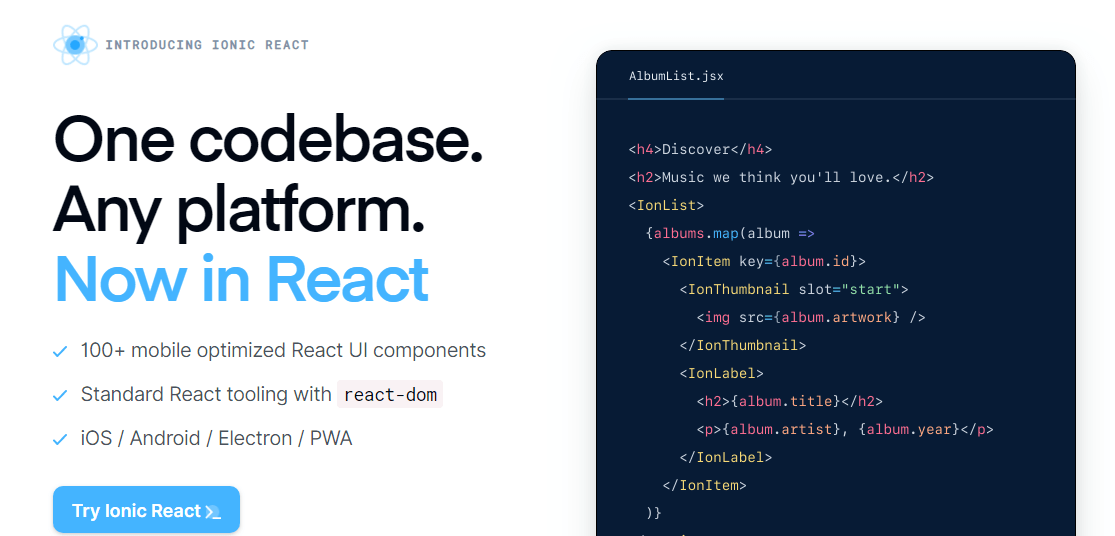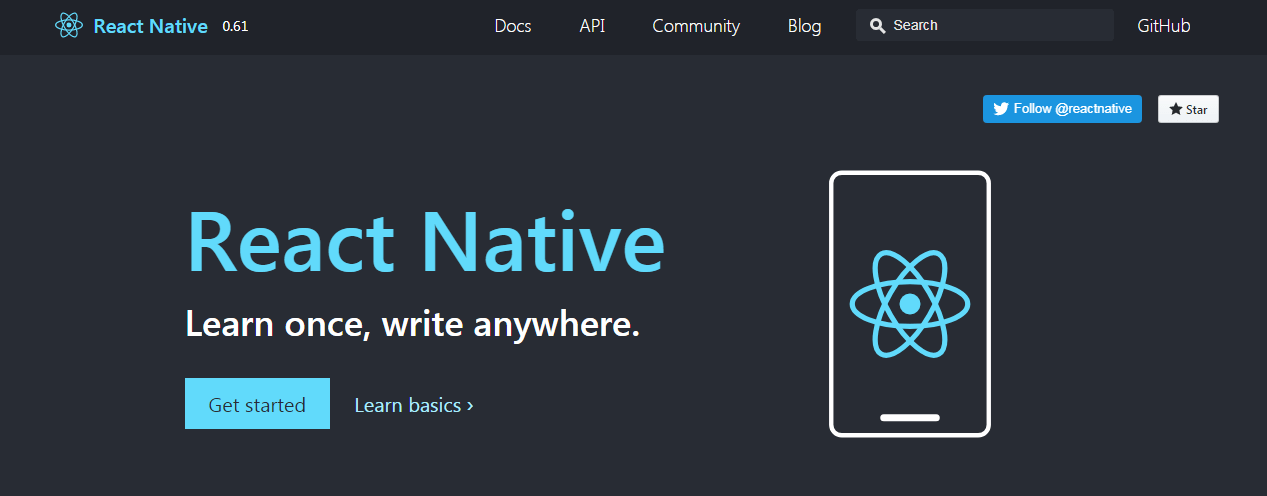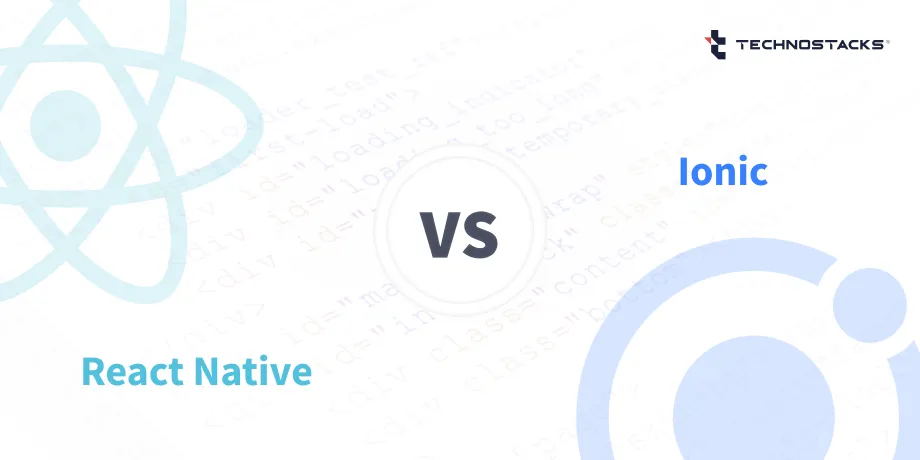Ionic Vs React Native – Which One To Pick For Your Next Project?
People who want to develop apps without using native toolsets prefer either react native or ionic development. They are now the most common alternatives, and there are a lot of passionate developers on both sides who are developing some of the best apps with ease. Various organizations use both of them, and there are a lot of apps that are designed using either one of them. They may seem like similar options right, but they both have their own set of differences and this article is going to deal with those differences. You are going to see the differences between ionic and react-native to various sectors.
Either you are planning on developing an app or want to learn either one of them or trying to choose a platform for your app and researching along with your developer, this list of differences will help you. First, let us understand what React Native and Ionic are.
Ionic is a hybrid mobile app development framework, whereas the React Native is a cross-platform that will help in building native apps. Hybrid mobile app developments means using one code and develop apps for various operating systems. Native app framework means using different programs for different operating systems.
Quick Comparison Table for Ionic vs. React Native
| Ionic | React Native | |
|---|---|---|
| Core Feature | Write once and use it everywhere | Learn the programming once and use it anywhere |
| Language Stack | HTML, Java, CSS, TypeScript, AngularJS | React and JavaScript |
| Nature of Apps | Hybrid apps | Cross-platform |
| Code reusability | Can be used numerous times, optimum reusability. | Code needs to be changed with platform |
| Benefit | One program can be used on various platforms, cost effective. Single code can be used for app development for iOS, Windows, Android, Desktop, Web and PWA. | Gives a native like elegant user experience. Best interface in any kind of platform. |
| Developers | Drifty.co | |
| Performance | Slower than the native apps due to webview. | Closer to the native look and is comparatively faster. |
| Testing of Code | Can be tested on any browser with ease. | The code can be tested only on a real mobile or developers can use emulator for testing. |
| Community and Support | There are a lot of people who are using ionic development platform and the community is pretty strong. | React Native is pretty popular and there is a huge community that provides constant support. Moreover, it is from Facebook so people can rely on it with ease. |
| Supported Platforms | iOS, Android, UWP (Universal windows platform) and PWA | iOS, UWP and Android |
| Learning curve | The learning curve is easy because of the web technologies, TypeScript, and Angular. | Steep learning curve |
| Companies Using | Untappd, Nationwide, JustWatch, Cryptochange, Pacifica, etc. | Instagram, Facebook, UberEats, Airbnb |
Google Trends Comparison of Ionic and React Native
Below you can see the Google trends comparison of Ionic vs. React Native. Ionic framework is older than react native and it has more users.
Ionic vs. React Native:- Detailed Description of Frameworks
Ionic Framework

Drifty.co launched Ionic Framework into the market five years ago, and now it is one of the standard frameworks for hybrid mobile app development. It gives an option for web developers to use one code and build apps on various operating systems with ease. The web technologies like CSS, HTML, and JavaScript to write a single code for so many operating systems and then use the features from PhoneGap or Cordova to give a native-like experience for the users.
Everyone can’t spend a huge amount on the app development, and the ionic framework will help them in developing apps within a specific budget. The structure has attained popularity to build modern and feature-rich elegant apps.
React Native Framework

Facebook has developed React Native, and it is a cross-platform framework that is based on JavaScript technology. It helps developers to build native-like apps by using a single code base. This scenario means that the core of code for every platform is going to be similar, and there will be modifications depending upon the operating system. The main aim of this platform is to build first-rate native applications by just using React and JavaScript.
Facebook takes the utmost care of React JS and uses it in various programs too. The company offered separate community support to provide practical solutions during the app development within no time. This dedicated community makes React Native an advanced tool.
Ionic vs. React Native:- Technology Stacks of Frameworks
The ionic platform is used to build hybrid apps, and it ultimately uses the SDK for this purpose. React Native is entirely different here. The main goal or objective of this platform is to “learn once; write anywhere.” It means that if one learns how to write the program once, they can use it on various operating systems with some modifications. React Native focuses on delivering a native experience for app users and tries to provide them with a seamless native experience. React native focuses on delivering practical user experience by using the native UI components.
Now when it comes to ionic, it is a platform that uses the power of superior web technologies to build multi-platform and multi-functional with very less code base. If you are already used to working with AngularJS, then you should work with ionic. It has a lot of built-in elements or components that will make your entire developing experience simple and easy. Ionic has grown into one of the most reliable options, and people prefer it a lot lately.
Ionic vs. React Native:- Performance
React Native delivers a native experience for both developers and users. This scenario is the reason why people who are more obsessed with native user experience prefer to React Native over ionic. React always aims to provide useful native experience. To achieve that, the programmers have to make some necessary changes depending upon the type of operating system they are using. React has always been a stable platform that is perfect for large scale applications. The main intention of React Native is to provide responsiveness and excellent performance, which usually costs a fortune for the users. But because of the React Native platform, this native experience is available for users at affordable pricing now.
On the other hand, Ionic platform mainly focuses on native browser apps using HTML, Angular JS, and CSS components. It proves a hybrid approach for app development and is perfect for the rapid prototyping of an app. The ionic app is modern, and it mainly focuses on the goal “write once and use anywhere” software paradigm. There are times when there will be massive delays and performance issues because of a lot of native callbacks due to the native code involved. On top of that, you should also have to download various plugins to assess the native features.
Ionic vs. React Native:- Difference in Features
The documentation of Ionic is more precise. This platform makes it easy for the developers to access its functions with ease. There is a predesigned set of styles that are already available, and they act as a great advantage for the Ionic platform.
When it comes to React Native, the documentation is a little bit complicated. However, it has a cool feature, which is also known as “hot reloaded feature.” This feature will allow updating and debugging of the running application without rebuilding it from scratch again.
Ionic vs. React Native:- Difference in Usage Levels
Both platforms are known for their simplicity. They are known as highly functional because it is pretty easy to recycle the codes. A code can be rewritten time, and again, it can also be modified depending upon the platform too. The ionic code follows a principle of write once and uses anywhere, whereas the react-native code is adjusted depending upon the platform.
Difference in Plugins and Community
React Native has a lot of plugins under its wings. The community of it is widespread, and there are a lot of developers who are available in the support team. Facebook has made sure that all the doubts that programmers have regarding React Native are cleared as soon as possible and hence provided colossal support. This platform also uses Cordova or PhoneGap plugins when required.
Ionic community is also well grown, and there is a huge support team that will help the developers time and again. There is a good number of plugins available for React Native too. PhoneGap/Cordova plugins are always available.
Ionic – Pros and Cons
Pros
- This program is entirely platform-independent irrespective of the language used like HTML, CSS, Angular, or JS.
- The interactive and user-friendly mobile apps can be created in a pretty relaxed and effective way with the help of Ionic.
- It is entirely wrapped by PhoneGap and Cordova.
- It can be used on UIWebView in iOS and WebView in Android.
- The developers can use TypeScript for developing apps on various platforms.
- Precise and updated documentation.
- Fast testing cycle.
Cons
- When there are too many call backs for the native code, there will be some performance issues.
- The development of advanced interactive or graphics transactions is not secure.
- The developers have to know AngularJS, which impacts the learning curve.
React Native – Pros and Cons
Pros
- Existing code can be reused time and again with some small modifications. This case saves up a lot of time.
- There is a broad development community support backed up by Facebook, so the programmers don’t have to worry about anything.
- The code is independent of the platform and can be used on different operating systems.
Cons
- React Native is created aiming the iOS devices only, and hence the Android app may require some efforts from the user’s end.
- This React Native is built-in for complicated applications, and it requires enormous resources and a reasonable budget too. People who are limited to some budget won’t be able to afford this platform.
How to pick any one of them?
It isn’t easy because both of the platforms have their pros and cons, along with functionalities. However, the user requirement is going to play an important part here. There are a lot of diverse factors that can influence one’s choice while picking ionic or react native. Here are some of such factors-
- Features
- Budget
- Time
- Customer preference
- Platforms
- Team size
Key Takeaways
Both of these frameworks offer serves for a different kind of purpose. Hence, it entirely depends on the customers’ requirements. If you are on a low budget and want an app that can be used without any hassle, then you can go with ionic. It won’t give a completely native app feeling, but it is good enough to manage your requirements.
If you have a budget and want an app that offers native feeling, then you can go with React Native. It will cost more, but the user interface and native belief that it provides are a lot better. Be it ionic or react native, you must hire a capable developer who can help you in getting things done. No matter how complex the project is, the right kind of developer will aid you a lot.








